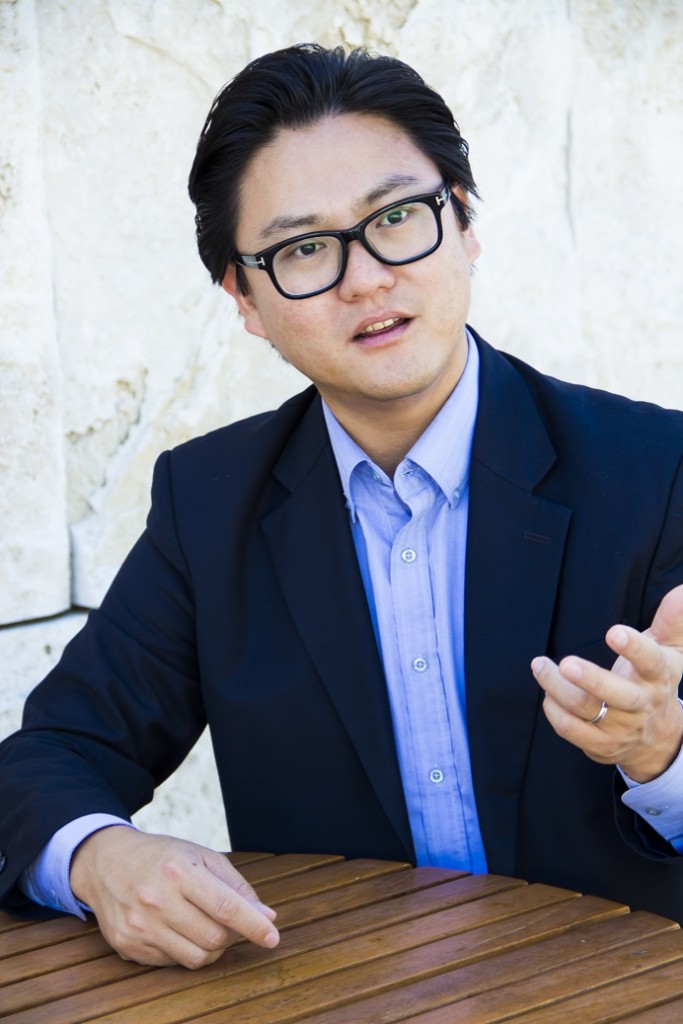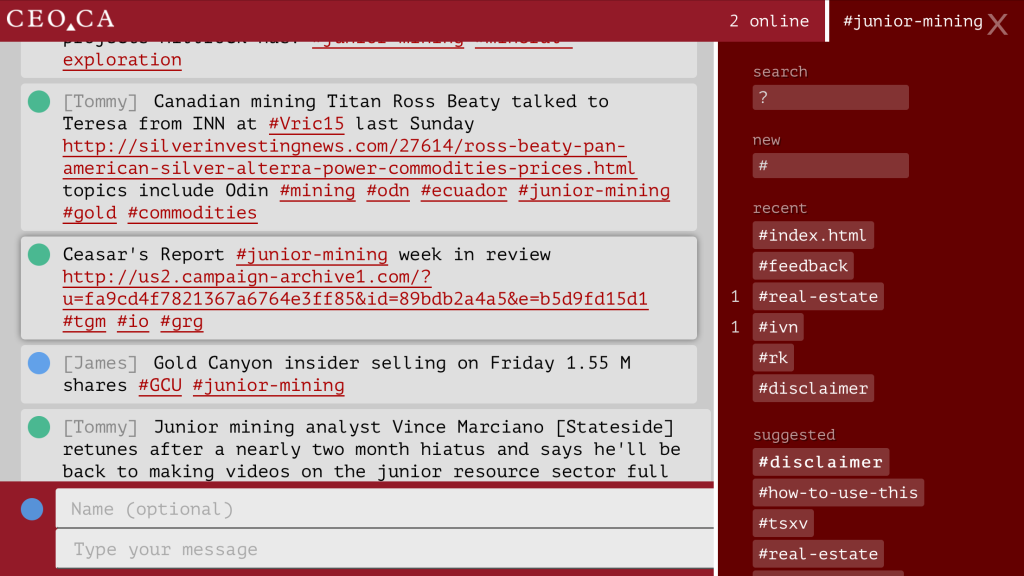Could a chat app save Canada’s venture markets?

Frankly Inc. (TSXV:TLK) CEO Steve Chung, leading the movement to bring white label mobile chat technology to consumer brands everywhere.
After four years of declines in financing activity driven by falling commodity prices, Canada’s once-proud public venture capital system is on the ropes.
Startups south of the border are waiting longer and longer to go public, if ever, with strong secondary markets for private companies providing nearly all of the liquidity advantages historically associated with having publicly traded stock. Entrepreneurs are asking themselves, why put up with the hassle of being public at such an early stage?
This trend doesn’t bode well for Canada’s TSX-Venture and Canadian Securities exchanges, which were created to help entrepreneurs tap into public capital. Nor has it served the financial institutions that specialize in publicly traded venture opportunities. So when I heard that one of Silicon Valley’s hottest technology startups was going public by reverse takeover of a Canadian public shell company—and raising about C $26 million north of the border—I got excited for Canada’s financial community. And when I took a dive into the company’s details, I realized it has a lot more going for it than its latest capital raise.
Frankly Inc. (TSX VENTURE: TLK) is leading the movement to bring white label mobile chat technology to consumer brands everywhere (B2B2C).
“Brands are tired of maintaining a social media presence on countless messaging platforms,” Frankly CEO Steve Chung tells me via Skype from San Francisco. Managing Facebook, Twitter, Linkedin, Instagram, Snapchat, BBM, etc, etc. is time consuming.
On the video call with me, Chung is preaching to the choir. CEO.ca runs a work-in-progress chat app at chat.ceo.ca, and we’ve already seen in its incredible potential in the short time we’ve been using it. Chat is the best tool we’ve seen to get instant feedback from our most loyal customers, as well as to provide customer service on the fly. It offers an immediate way to demonstrate expertise and share inspiration, especially with younger audiences. It’s also fun. I’m actually completely addicted to it, but I’m getting off topic.
Frankly didn’t set out to become the leader of the white label chat app movement. With a substantial seed investment from SK Telecom—South Korea’s largest mobile communications company—as well as Stanford’s StartX venture incubator program, Frankly was originally an ephemeral chat service (disappearing chat messages) for consumers. In its first year, Frankly attracted over two million users and gained critical product recognition from Google and Apple.
Last year, competitors such as Instagram, Whatsapp and Snapchat were growing exponentially, and trying to play catch up wasn’t appealing to Chung. That’s when he saw an even bigger opportunity: providing the technology that powers Frankly Chat to other brands to use as their own chat tool within existing applications.
“Rather than trying to fight the messaging war, we’re becoming an arms dealer," Chung quipped.
The company’s first partner, Victoria’s Secret, is now using Frankly’s chat application for their PINK Nation campaign. It’s been a big success for increasing their engagement, Chung says.
Chung has asked his investors for eighteen months of patience before they expect to see significant revenues from Frankly, citing the time it will take to perfect the business model. The company has over $30 million in the bank (and a roughly $65 million CAD market capitalization)—which Chung says would cover two and a half years at the company’s current burn rate.
When I pressed Chung on why he raised money through the public markets in Canada, and not from traditional venture capitalists in his home-base of Silicon Valley, he assured me that he wasn’t turned down in San Francisco. In fact, he never even pitched the company there—he thinks Bay Area venture capitalists require too much say in a company and are incentivized to take outsized risk.
The promise of a publicly traded stock-option for his employees is another reason why Chung chose to take Frankly public in Canada.
“It’s a war for talent out here,” Chung says of finding web development talent in Silicon Valley. “Having a publicly traded stock option with monetizable value is something very unique.”
Frankly has twenty-six full-time staff, and will grow to forty over the course of 2015. Roughly sixty percent will be developers or engineers.
The public markets also provide Frankly with the opportunity to tap additional capital if and when the time comes, and allow greater strategic options in the event of a M&A.
“My eyes are open to ideas that will return alpha to shareholders,” Chung says.
On top of his MBA at Stanford, Chung completed his undergrad at Harvard, and was an analyst at Goldman Sachs—all before working with two publicly-traded technology companies in senior management roles. The thirty-six-year-old emigrated to the USA from South Korea when he was nine, and quickly became the family translator.
“Mine is a typical immigrant story,” Chung says. “It was a good day for my Asian parents when I got into Harvard,” he laughs.
We discussed the grueling schedule of being a publicly-traded CEO, constantly pitching investors. Chung promises to spend twenty-five percent of his time communicating the story to the market, and notes that he has the help of Frankly’s financial team.
As for the Canadian who convinced Chung to take Frankly public in Canada, Toronto-based merchant banker Ron Schmeichel of JJR Capital invested $5 million and provided the shell vehicle for the RTO. He also brought Cormark Securities and Beacon Securities as financial partners to Frankly’s Canadian debut.
Investors are pleased with Schmeichel’s performance in other companies, including Element Financial and Concordia Health Care, two well-performing JJR Capital vehicles. His record should bode well for Frankly in its early release. In its first month of trading, despite the overall markets being significantly down, the company’s stock has hovered around $3, its most recent financing price.
Frankly is an innovative company in the mobile messaging space—which is perhaps the hottest segment of the venture capital markets right now—and it’s one of the only Silicon Valley startups accessible to Canadian investors. And by occupying such a strategic position in the marketplace, Frankly is a also a prime target for big-pocketed tech companies who may put it at play over the next twelve months.
“Technology moves and it's unpredictable,” Chung says. “A good team can respond effectively to a changing market. Investors need to know that they have a good captain in me, and we’ve got incredible oversight from our board members and investors.”
While I am confident the chat race is real, time will tell whether Frankly will emerge as the consumer brand’s go-to chat partner. As a Canadian entrepreneur, I’m hopeful Frankly is a big winner for investors, and will inspire other innovative US-based companies to our markets.
“Canada is not viewed in Silicon Valley as source of capital, nor a hub of technology innovation, but I think that once you get to know Canada better, there's a great willingness, and the talent and capital markets to really support entrepreneurship there,” Chung says. “I feel very lucky to have come across this opportunity.”
Go and tell us what you think about Frankly at http://chat.ceo.ca/ and http://chat.ceo.ca/TLK

























What’s ur predication on the frankly stock?